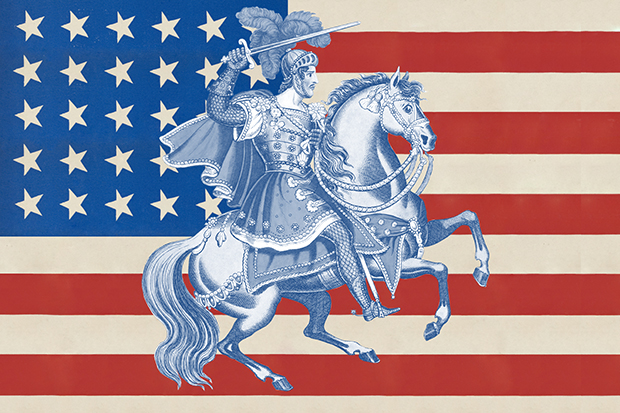Where do we see medieval tropes this election season?
Professor Dorothy Kim explains
 Illustration/Jessica Tanny
Illustration/Jessica TannyIn the run-up to the presidential election, BrandeisNOW asked faculty to provide analysis and insight into some of the most pressing issues facing the country. This is part of the series. Dorothy Kim is an assistant professor of English.
During this US presidential election season, we are seeing various medieval tropes appear in various arenas related to the current election season. They range from the expected to the absurd to the rhetorically complex.
The expected: White supremacists love knights
One example lies within the Proud Boys, the white supremacist group Donald Trump told to “stand back and stand by” during the first presidential debate.
The violent military arm of the Proud Boys, which aims to instigate violent confrontation with #BlackLivesMatter and antifascist protestors, is called the Fraternal Order of the Alt-Knights (FOAK).
The image of a knight is an expected and popular go-to for the far right, as we can see in the longer history of David Duke’s the Knights of the KKK.
The absurd: A senator’s nonsense comparison to Atilla the Hun
In television ads of Senator Kelly Loeffler, who is seeking reelection in Georgia, she is compared as “more conservative than Atilla the Hun.” The ad shows a bizarre depiction of Atilla grunting that he will “Fight China.”
As my medievalist colleague at the University of Bonn Erik Wade aptly explained, Atilla was not “white” but actually from the multiracial Asian steppes. But also never attacked China., That was Genghis Khan. Along with the whitewashing, the ad also encourages violence against the conservative right’s “foreign” enemies.
The rhetorically complex: A medieval-themed appeal to less extreme conservatives
The medieval heritage past enervates the rhetoric of the conservative and far right. Democratic campaign strategist James Carville recently turned some of that rhetoric on its head to appeal to conservatives.
In a piece written for The Bulwark – an online publication founded by “never Trump” conservatives Bill Kristol and Charlie Sykes - Carville describes the attempt to unseat Donald Trump and take congressional power from Republicans as “A Crusade for Something Noble.”
He links medieval crusades with the defeat of the Nazis in World War II through Dwight D. Eisenhower’s memoir “Crusade in Europe.” Carville acknowledges the term’s medieval problems but continues with “crusading” as a way to describe the current political task of this election, even though medievalists have pointed out that the term is a 19th-century invention of colonialism, not a “class of civilizations,” and if we want to be accurate, the Christians lost.
It’s not the first time the crusades have been used as a political rhetorical tool, but it is most commonly a tool of conservatives and the far right as a war trope.
Carville’s reshaping of this rhetoric is an interesting approach because it appeals to the terminology, rhetoric and narratives of people who are in conservative information bubbles. Before they realize the message reaches a different conclusion than they expect, perhaps they are already starting to be persuaded.
Categories: Humanities and Social Sciences, Research





